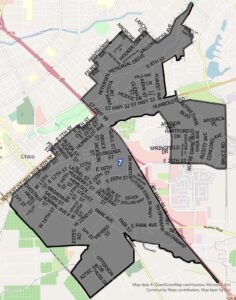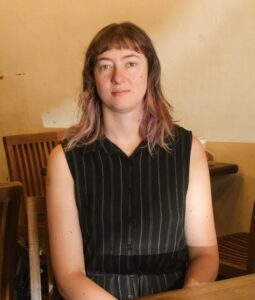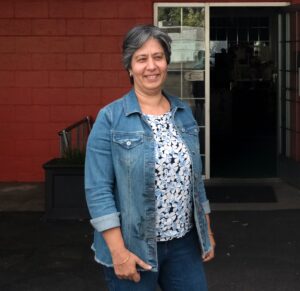by Yucheng Tang
posted Oct. 26
This is the fourth story in our City Council election series.
District 7 voters have a choice. Candidates Bryce Goldstein and Deepika Tandon both want better streets and more housing projects, but differ on other crucial issues, including homelessness, climate change and wildfire planning.

Goldstein, a transportation planner, has served as a City of Chico commissioner for the past five years, formerly on the Planning Commission and now as a Climate Action commissioner. She says on her website that she wants a community where “everybody can afford to live … where everybody can access fresh groceries without having to own a car, and where our trees, parks, and creeks are protected.”
Tandon, who runs a south Chico grocery/deli, has served on the Council representing District 7 since 2020. She immigrated to Chico from Delhi, India, in 2007. She wants to serve another term because “it’s another chance for me to give back to this community. We still have a lot of campers out on the streets. Public safety is still a concern for a lot of residents. There is still a bit more work that needs to be done.”
Homelessness
Challenger Goldstein would build managed campgrounds with social services available to campers, while incumbent Tandon opposes that step and would encourage unhoused people to take more responsibility for their plight.
“We need to have a space where people can go to not be in the parks, because it’s going to take a long time — regardless of how we do it — to get people into permanent housing,” Goldstein said in an interview last month at a downtown coffee shop. “We should build them with security, bathrooms, dumpsters, connections, social services, and with the idea that we’re getting people eventually out of the managed campground space and hopefully into permanent housing.”

The managed campground plan, Goldstein explained, could include multiple locations or a “larger camp area with separate communities within it.” She would support existing services like those provided by Genesis, the pallet shelter village, and work with providers like the North State Shelter Team.
Goldstein has been a longtime Safe Space volunteer and has seen that a lot of people don’t fit in well at the existing shelters for various reasons: They might have had conflicts with people who are staying there; they might have pets that aren’t allowed; they might fear being in enclosed spaces with many people.
Goldstein notes that she has a housing-first approach. “How do you hold somebody accountable to become sober if they don’t even have a roof over their head?”
Tandon on the other hand doesn’t think opening managed campgrounds is a good solution: “I don’t think we should build anything more till we know what we need. We are just guessing that the managed campground would help and I would not support spending more taxpayers’ money on something that will not be used.”

Tandon said some in the homeless community “don’t like rules.”
“The managed campground will also have a set of rules, and I don’t think those homeless people will go to the managed campgrounds, either,” Tandon continued, noting that Genesis already offers many services.
“People who are out now are choosing this lifestyle, but that doesn’t mean that we can let our city or our public spaces be unsafe for the rest of the community,” Tandon said. “The person who is in a tough situation needs to take that first step, to accept the treatment, to accept whatever they need.”
How should the City encourage people to accept the services they need?
“I’m not an expert in that, but we have experts,” Tandon responded, mentioning in particular behavioral health staff. “Those are the people that we need to rely on.”
Housing development
Both Goldstein and Tandon support more housing projects and say they want all types of housing. However, Goldstein strongly advocates for infill development and “smart growth,” and they disagree on the planned community, Valley’s Edge, that was defeated in a referendum. Tandon supported it because “we need all kinds of housing” and Goldstein opposed the project because its “impact on climate action goals” was never fully explained to the public.
Goldstein describes smart growth on her website as an approach that encourages diverse housing and transportation options and reinvestment in existing neighborhoods. She writes that she wants to create infill developments “featuring both housing and businesses.”
“We have vacant lots in our neighborhoods that already exist,” she told ChicoSol. “We can both have a higher quality of life for people who want to live within a city and to have less expenses on cars and things. We can help improve the existing core of our city by having more people live near local businesses.”

To achieve this goal, the City would reduce the parking minimums for building and change zoning in some areas. “Smart growth rejects the status quo of sprawling single-family homes, but it’s not all high-rise apartments either,” Goldstein said.
She says she is an advocate for “missing” middle housing, which includes town homes, triplexes and housing that is between big apartment complexes and single family detached luxury houses.
Tandon also said she wants to see more housing projects and agrees with the concept of infill development. “They are very close to the resources. You already have sewer, water, electricity. Everything is there.”
But she also said: “We cannot force a developer to build on land that is expensive for them to buy. Also, every person has a different desire. I want to live in a house. I would not want to live in an apartment building, but there are not many single family houses that are in the pipeline right now.”

She noted the City Council’s accomplishments that include dissolving the Bell-Muir special planning area and approving some single family housing projects.
Climate change and fire
Tandon places more responsibility for addressing climate change on individuals and feels comfortable with what the City has done to prevent wildfires, while Goldstein argues that the Climate Action Commission should meet more often and more preparations could be made to prevent another major fire.
“I personally believe that climate action is more about (raising) awareness of the community. The City can only do a little bit,” Tandon said.
Tandon is satisfied with the occasional meeting frequency of the Climate Action Commission. “What we have decided in the chamber is that to meet as needed is good enough, because every time we meet, we actually are using more resources … we use power, we use other things,” she said.
Has enough been done with controlled burns and other measures to avoid a major fire?
“During my conversation with the fire chief, he feels confident that we don’t have any dangers as of now,” Tandon said. “I know we have goats grazing in the park. We are trying to mitigate [fire danger] with the goats. There are goats on the Lindo Channel as well. I feel pretty safe about where we are.”

In contrast, as an appointed Climate Action commissioner, Goldstein is concerned about various risks brought about by climate change.
“We’re at risk of a wildfire potentially burning into Chico,” Goldstein said. “We’re at risk of air quality impacts and housing impacts from huge wildfires. We’re also at risk of drought, flooding, all kinds of other public safety issues that are made worse by climate change, but our City Council has never really wanted to address it.”
She believes the commission should meet more regularly. “We don’t have to meet every month. But it’s been at least seven months since we have met. And I’m sure there are things we could talk about. We could at least know, as a commission, if we are on track to meet our Climate Action Plan goals, and the latest things happening in the city that we should be aware of,” she said.
“I believe that the boards and commissions should be an opportunity for community members who are experts in a topic, or just want to get involved, to have a say without having to go through the whole process to become a City Council member. It helps decentralize our power, because we’re not just relying on seven people on the City Council to hold all the power and know everything.”
Goldstein’s approach to preventing another major fire would be “to do more land management or prescribed burns that would involve working with the tribe and working with local organizations that do burns,” she said. “We could be more prepared.”
Yucheng Tang is a California Local News Fellow reporting for ChicoSol. Read Yucheng’s stories on the District 1, District 3 and the District 5 races.

“… don’t think we should build anything more till we know what we need. We are just guessing that the managed campground would help and I would not support spending more taxpayers’ money on something that will not be used.” We know people need shelter to survive. The Chico area has seen an increasing number of deaths on the street of people who had been living without shelter. The City and the County have declared official Shelter Crises. The North State Shelter Team’s Revised Managed Campground Proposal would primarily be funded by donations, fees paid by the participants and grants. The Proposal is modeled after programs in Marysville and Eugene that have been successful for eight to ten years respectively. So we know it is a proposal that will work.
But she is fine spending millions of dollars of tax payer money on sweeps of homeless camps that are obviously not working.
Megafires are the greatest threat to our families, our homes, our property and our neighborhoods! You only have to look at the Paradise Fire that killed 85 people and burned 18,000 homes, or the Berry Creek Fire that killed 16 people and burned 1238 homes, or the Redding Fire that killed killed 8 people and burned 1546 homes; we are now in the age of Megafires! Chico already has 2 strikes against it with the Paradise Fire burning 1 home in Chico before being stopped and the Park Fire starting in Bidwell Park and burning 641 homes as it traveled northward out of Chico. If the wind had been blowing westward we would have no Chico today. Chico’s third strike is going to be a catastrophe if we don’t start prevention plans.
The City of Chico in 2022 published the Community Wildfire Protection Plan, a blue print of how to protect Chico through defensible space, prescribed burns, grazing, fuel reduction, vegetation management and the hardening of homes. I sent an email to Deepika Tandon asking what and when was Chico going to start implementing this important blue print? She ignore me even though 3 other councilmembers felt it was their responsibility as elected officials to respond. 21 days after my dated email I questioned her about it at her meet and greet campaign at Rotary Park. She claimed that she had responded and I advised several times that she had not. She stated she would forward to me her response that night. I have yet to receive a response after 9 days now.
It is disheartening that Deepika Tandon cannot demonstrate to citizens that the safety and security of our families and homes is a priority to her, or that she cannot keep a promise.